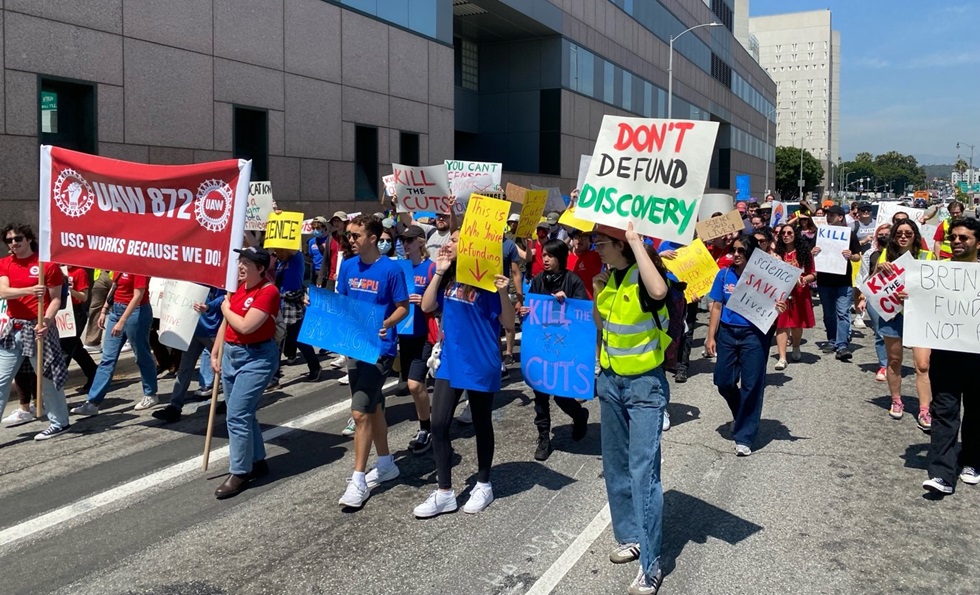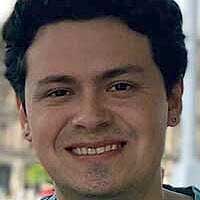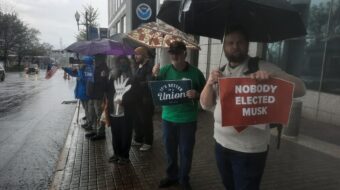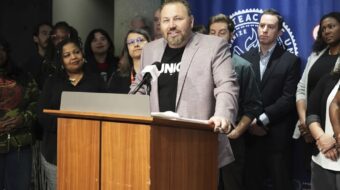
LOS ANGELES – Thousands of academic workers at California universities joined a nationwide day of action on Tuesday, April 8 to protest the Trump administration’s slashing of research and education funding. The cuts threaten deadly consequences for working-class people.
Hundreds of members here of United Auto Workers (UAW) Local 4811, which represents academic workers at the University of California (UC), marched from UCLA’s campus to the Westwood Federal Building. Across town, other UAW locals representing academic workers at the University of Southern California (USC) and Caltech, turned out to rally at the Downtown Los Angeles Federal Building.
This local manifestation of the nationwide Kill the Cuts action, sponsored by a coalition of labor unions, patients, and patient advocates, aimed “to raise awareness and put pressure on elected representatives to fight back against Trump’s attacks on research, healthcare, and higher education” according to the Kill the Cuts website.
It also states that “Trump’s attacks on National Institutes of Health, National Science Foundation, and the Department of Education jeopardize medical progress in areas like cancer, viral pandemics, heart disease, diabetes, and Alzheimer’s, while threatening the jobs of researchers across the country.”
The UAW, the ACLU and other organizations and individuals have responded to these attacks with a lawsuit against the National Institutes of Health (NIH) over the billions of dollars of research grant money it cancelled on the Trump administration’s orders. These cancellations constitute what the lawsuit calls “a reckless and illegal purge” intended to “stamp out” NIH-funded research on topics under fire from the MAGA movement, including vaccinations, climate change, and the health of women, racial minorities, and LGBTQ+ people.
The NIH is the most significant source of research funding for the University of Southern California, accounting for more than a third of the university’s research budget in fiscal year 2016. In 2022, USC received $387 million dollars of NIH funding. The NIH is also the largest funder of UC research, providing more than 60 percent of the university’s federal awards last academic year.
In short, the Trump administration’s targeting of these funds poses an existential threat to entire life-saving fields of research and the future of higher education. On top of the federal cuts, in California, Governor Gavin Newsom’s proposed budget for 2025-2026 includes an 8% budget reduction to the UC and California State University systems.
“These cuts to NIH funding, and the cuts that are threatened towards higher education all across the country, they threaten not only graduate student workers—their paychecks and visas—but also threaten the working families that rely on the healthcare economy, that benefit from this healthcare research, and the higher education economy as a whole,” said Kyle Hulburd, a member of UAW Local 872, the union representing graduate student workers at USC.
At the Downtown Los Angeles rally, workers from USC and CalTech gathered with the intention to make “legislators hear us,” said a USC political science student, highlighting the action as an important way for union members to “make our concerns known, raise our issues… we want education to be protected, we want money for jobs in our research, we don’t want our taxpayer money to fund billionaires, we want it to fund education and research that is saving people’s lives.”
“Federally funded research is the reason we’re all living and breathing and walking here today,” said Tara Kerin, a project scientist at UCLA who has researched infectious diseases on NIH-funded grants, in a speech to the crowd gathered at Bruin Plaza. “Certainly we have all benefited from a medication that was developed by NIH-funded studies. Certainly all of us benefit from clean air, unleaded gasoline, and drinking water, from policies developed from the findings of NIH-funded research” she added.
These rash, sweeping funding cuts from the federal and state level will have enormous negative impacts on working people in the U.S. and the world.
In the words of Mike Miller, director of UAW Region 6, who spoke at the Downtown LA rally: “Cutting research funding will kill hundreds of thousands of jobs and, even worse, it will kill the hope of working people and their loved ones with cancer and other deadly diseases who rely on this research to see new treatments to save their lives.”
Miller included a call to action, urging all to “Tell your representatives not to let Trump cut their lives short or worsen the quality of their lives. Too many people confronting an aggressive cancer diagnosis or other deadly disease can’t afford to wait months or years for new treatment options, their only hope is advanced research now.”
What kind of power…?
“Union power!” chanted participants at both rallies.
Aya Konishi, a UCLA graduate student and 4811 organizer, told People’s World that “As a union, we have a powerful collective voice to be able to show the Trump administration that this is important not just to a few of us but to all of us.”
Ishaan Thota, a member of USC’s grad worker union, added that, “historically, academic workers have been treated not quite as workers,” even though “it is work.” He noted that “it’s been a lot easier to take advantage of the work that we do” when it’s not recognized as such, underscoring the importance of labor union organizing for academic researchers’ ability to “collectively bargain for what we think is right.”
“In this case, because we have formed a union successfully, and we’ve collected our power in this organized fashion, we’re hoping to push back against the austerity measures,” Thota said.
“These cuts have already taken the jobs of several researchers across the UC system, and if they’re not stopped, it’s likely there are more to come,” Konishi said. Thota expressed the widespread effects of cuts to medical research, explaining that “it touches everybody.”
Thota, a graduate student in quantitative and computational biology, also spoke with People’s World about how medical research has impacted him and his family, saying “only a few years ago, my sister had an extremely severe seizure. So bad that her lung function and heart function had almost completely stopped, and normal methods to reactivate that couldn’t work.”
ECMO, a more cutting-edge technology, whose “uses are still being researched,” however, was able to “oxygenate her blood, pump her heart, and keep her alive” for the weeks it took for her recovery.
“I care a lot about this research, it’s really directly impacted my life. She would not be here without this kind of research,” Thota shared.
Konishi also spoke about how cuts to research, and the proposed budget reduction for California public universities, will impact teaching and learning conditions. She noted how decreased funding will mean “crowded classrooms, less money for teaching, and a reduction in the quality of education as well.” Students and workers will feel the effects of this ill-considered corner cutting for decades to come if lawmakers stand idly by.
DEI on the chopping block
Elisa Pabon, a postdoctoral researcher at UCLA, addressed the Westwood rally. She shared how her research training was facilitated by diversity programs and initiatives to support scientists from underrepresented backgrounds, including an NIH Predoctoral Diversity Fellowship. “Guess what happened to those?” Pabon asked the crowd. “They all got cut!”
“I wouldn’t be standing here in front of you today if those funding mechanisms didn’t exist,” Pabon remarked. “Now they’re gone.”
Sirina Nabhan, a systems engineer at the Jet Propulsion Laboratory, spoke at the downtown rally about how programs at her workplace in diversity, equity, and inclusion (DEI)—as well as climate change—were under attack, forcing her “to take the day off and get loud.”
The purpose of diversity-focused grants and fellowships, which provide mentoring, training, and support systems to researchers from underrepresented communities, is to make science more accessible and equitable for all, and remedy historical barriers. Studies also show that in healthcare and science, a more diverse workforce increases the quality of research, as well as patient care and outcomes.
Nabhan explicitly warned that these efforts to undercut the mission of institutions of higher learning and research are “anti-science, and yes it’s fascist.”
At the downtown rally, speakers also emphasized how the cuts endanger research focused on important health and medical questions affecting underserved communities that have been historically ignored in biomedical research.
Seeta Rajpara, for example, spoke to the crowd about her years of researching cancer. “In my work, we see the highest rates of certain types of cancers coming from close to the Mississippi Delta. Living near runoff from petrochemical sites has led to a significant rise in cancer rates in this region. Lots of these patients are in their teens and 20s,” she told rally participants.
Rajpara explained that labs studying these critical topics have had to pause testing on samples from cancer patients, meaning they cannot continue their research nor provide the clinical tests their patients need to inform their healthcare decisions. In the future, it’s likely that scientists, to get funding, will change their research directions to reduce focus on vulnerable groups or other topics that could be considered DEI related.
The Trump administration “has focused on gutting anything related to the letters ‘DEI,’ without thinking of the significant consequences this will have on all Americans and people around the world,” Rajpara passionately reproached. She emphasized that “We cannot fully understand cancer without studying diverse communities and genetic populations.”
Anny Viloria Winnett, a graduate student researcher in public health at UCLA, emphasized in her speech to the Westwood rally that “as workers, we have to think about this issue as an issue that threatens, in particular, international scholars.” In a video posted by the UAW International Union, Yourae Shin, a graduate student researcher at the University of California, Riverside, explains that for international scholars, “Losing our jobs effectively means deportation.”
“Thousands of international workers stand to lose their visas, stand to lose their funding, in one more attack of this administration to divide us,” Viloria Winnett stressed. Her speech focused on unity and the power of the labor movement to act in opposition to the divisive far-right agenda coming out of the White House. “With every new attack from this administration, we need to remember that as union workers we have the power to fight and the power to win because we have done it before.”
Miller’s speech also emphasized the threat to international scholars, declaring before the energized and empowered crowd, “We’re also here to tell the Trump administration to stop terminating the visas of international workers, who provide so much of the life-saving research. It’s wrong. It’s against the constitution. It’s against basic principles of union solidarity. It hurts the economy. It further destroys research. And we’re not going to fucking take it!”
Education and research under siege
Together, the assaults on science research, DEI initiatives, academic freedom, and international workers represent a coordinated attempt by the far-right billionaires in control of the federal government to strip education of its public value.
Last week, on April 3, the so-called Department of Government Efficiency notified hundreds of recipients that grants awarded by the National Endowment for the Humanities (NEH) have been terminated, and then notified roughly 75 percent of NEH staff that they have been placed on administrative leave. The grantees include state humanities councils, museums, teachers, researchers, and organizations that serve the public.
All these cuts hasten the theft and hoarding of research and education resources by private corporations and billionaires in service of their own political, social, cultural, and economic agenda. The dismantling of the public research and education sectors will spell the extinction of whole fields of research and study that benefit working people, and the attacks on DEI in higher education will mean losing decades of gradual progress in democratizing science. Without a fight back, led by labor and its allies, working people will be left with a world impoverished, devoid of options for the pursuit of education and scientific progress based on public good and democratic will.
We hope you appreciated this article. At People’s World, we believe news and information should be free and accessible to all, but we need your help. Our journalism is free of corporate influence and paywalls because we are totally reader-supported. Only you, our readers and supporters, make this possible. If you enjoy reading People’s World and the stories we bring you, please support our work by donating or becoming a monthly sustainer today. Thank you!












